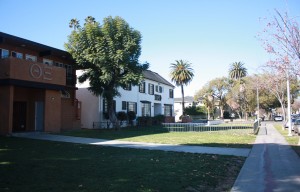Pre-Rush canceled for spring semester
The Interfraternity Council will be enforcing the university’s decision to prohibit fraternity pre-rush week parties. This decision comes as part of USC’s effort to change Greek life’s alcohol-centered image, as well as to reduce safety risks and associated costs.

Greek · Houses on the Row are prohibited from hosting pre-rush parties this week, because of alcohol incidents and expensive security measures. – Lauren Wong | Daily Trojan
“The university felt that alcohol was becoming too big a part of the recruitment process,” said John Martello, vice president of recruitment for IFC. “The university worried about the danger of raging parties the first week of school and hopes to change the first impression freshmen make of Greek life by eliminating those parties.”
Another factor in the decision was the huge cost associated with securing the Row during pre-rush parties in the past. During the fall 2012 semester, two nights of Welcome Back parties cost the university $20,000 in security measures, according to Martello.
The IFC had no role in the decision but supports it fully and plans to enforce it, according to IFC President Ofek Lavian.
This new policy means that no parties will be allowed on 28th Street, better known as the Row, during the first week of classes. Welcome Back Nights, the first Wednesday and Thursday of the semester that have historically been some of the most active nights on the Row, will be dry for all semesters to come.
The traditional Row moratorium during rush will follow from Jan. 18 to Jan. 26, a week of limited social activity implemented “to prepare for and effectively carry out rush,” according to the IFC website. Martello explained that all fraternities must have alcohol out of their houses by Friday, Jan. 18, and a team of IFC members will be patrolling the Row to ensure that this rule is followed. Violators will be written up and referred to the IFC judicial board.
Some students are concerned that the party ban will have a negative effect on fraternity recruitment, even though they may agree with the ban’s intention.
“I don’t think that freshmen, nor any other college student, should only think of college as a place to party,” Michael Belling, a freshman economics major in Zeta Beta Tau, said. “That being said, I don’t think pre-rush parties define that image for USC. People will form their views of college based on their entire experiences, not only on their first impressions.”
Allegra Bishop, a freshman majoring in biological sciences, supports the ban because it will reduce the number of students transported to the hospital, but is skeptical about the effectiveness of the ban in the long-run.
“There’s no way to ban parties all semester,” Bishop said. “And there’s definitely no way to keep new freshmen from making their own opinions — whether at a pre-rush party or one the very next week.”
Lavian, however, is confident that the new policy will have little effect on fraternity recruitment. He said some fraternities will be hosting off-campus events to replace the traditional pre-rush parties and that rush will continue as scheduled from Jan. 21 to Jan. 24.
“I’m 100 percent confident that the policy will have no impact [on recruitment],” Lavian said. “If anything, it will make people more open-minded about all the fraternities and will give everyone a clean slate during rush without the impression they made the week before.”
